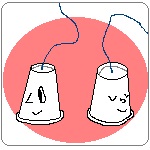風鈴さんの おぼえた日記 - 2023年12月6日(水)
| 26 | 27 | 28 | 29 | 30 | 1 | 2 |
| 3 | 4 | 5 | 6 | 7 | 8 | 9 |
| 10 | 11 | 12 | 13 | 14 | 15 | 16 |
| 17 | 18 | 19 | 20 | 21 | 22 | 23 |
| 24 | 25 | 26 | 27 | 28 | 29 | 30 |
| 31 | 1 | 2 | 3 | 4 | 5 | 6 |

この日記をフォローしているユーザ
この日おぼえたフレーズ(英語・中国語・ハングル)
おぼえた日記
自己表現のためのフランス語 mercredi 6 décembre
Leçon 27 Parler de ses habitudes
ふだんの習慣を話す(復習)
👩 Tu arrives a l’universite a quelle heure ?
👨 J’arrive a huit heures et demie.
👩 Tu sors souvent le week-end ?
👨 Non, je reste toujours a la maison.
👩 Qu’est-ce que tu manges le matin ?
👨 Je mange du riz.
👩 Et qu’est-ce que tu bois le soir ?
👨 Je bois souvent du thé vert.
Mais je prends parfois du café.
📚 部分冠詞 数ではなく、量でとらえる
不定冠詞、定冠詞は名詞が表わすものを数でとらえますが、部分冠詞はそれを量でとらえます。数えられない、とくに数えない名詞に用いるのはそのため。
De l’eau, s’il te plaît. 水、お願い、のように、この部分冠詞はある量の水を表わす。
※数えられないため、部分冠詞には複数形は存在しない。
男性名詞の前 du
女性名詞の前 de la
母音の前 de l’
▶ 用法 食べ物・飲み物
食べる対象・飲む対象となる場合は、「一部を食べる・一部を飲む」と捉えられるため、原則として名詞には部分冠詞をつける。
manger du poisson 魚を食べる
●poisson [pwasɔ̃ポワソン] m. 魚
骨や内臓は食べず、魚の肉の「一部」を食べるという感覚です。
ただし、「魚」という名詞には部分冠詞がつくと決まっているわけではない。
「水槽の中には 5 匹の魚がいる」という場合は数えられるため
cinq poissons 5匹の魚
また、「私は肉より魚のほうが好きだ」という場合は「肉というもの」「魚というもの」というように「概念化」されるため、定冠詞がついて「le poisson」となります。
このように、同じ名詞でも、捉え方によって部分冠詞がついたり、他の冠詞がついたりします。
①あるいくらかの分量の~
du riz 米 du la salade サラダ de l’eau 水
※部分を表す前置詞 de と定冠詞が付いた形(~の一部分)
②抽象的な名詞
du courage [kuraːʒクラージュ] m. 勇気
de la partience [pasjɑ̃ːsパスィヤーンス] f. 忍耐
📚 不規則動詞の活用
prendre [prɑ̃ːdrプラーンドル] 食べる、飲む
Je prends du riz. 私は米を食べる。[pʁɑ̃プラン]
Tu prends du the vert. 君は緑茶を飲む [pʁɑ̃]
Il prend du vin. 彼はワインを飲む [pʁɑ̃]
Elle prend du chocolat.
彼女はチョコレートを食べる [pʁɑ̃]
Nous prenons du fromage.
私たちはチーズを食べる [pʁə.nɔ̃プルノン]
Vous prenez du lait.
あなた(がた)は牛乳を飲む [pʁə.neプルネ]
Ils prennent de la salade.
彼らはサラダを食べる [pʁɛnプレンヌ]
Elles prennent de l’eau.
彼女らは水を飲む [pʁɛnプレンヌ]
arriver [ariveアリヴェ] 着く、到着する arrive
j’arrive [ja.ʁiv] tu arrives [a.ʁiv]
il arrive [a.ʁiv] elle arrive [a.ʁiv]
nous arrivons [a.ʁi.vɔ̃] vous arrivez [a.ʁi.ve]
ils arrivent [a.ʁiv] elles arrivent [a.ʁiv]
sortir [sɔrtiːrソルティール] 外出する、遊びに出る go out
je sors [sɔʁ] tu sors [sɔʁ]
il sort [sɔʁ] elle sort [sɔʁ]
nous sortons [sɔʁ.tɔ̃] vous sortez [sɔʁ.te]
ils sortent [sɔʁt] elles sortent [sɔʁt]
👄 発音
eau [oオ] オ
eau [oオ] f. 水 beauté [boteボテ] f. 美
👄 2種類の h
▶ 無音の h (h non aspiré) [aspire]
直前の単語とリエゾン、アンシェヌマン、エリズィヨンの対象となる
Parler de ses habitudes.
フランス語、ラテン語起源の単語に多い
▶ 有音の h (h aspiré)
直前の単語とリエゾン、アンシェヌマン、エリズィヨンの対象とならない
Je mange des haricots.(des と haricots がリエゾンしない)
ゲルマン語、外国語起源の単語が多い
🛀 今日のひとこと
C’est la fin des haricots ! インゲン豆の終わりだ!
●finir [finiːrフィニール] ~を使い終える、食べ尽くす
●haricot [arikoアリコ] m. インゲン豆
万事休す、もうおしまいだ!
ラジオ英会話 Lesson 163 発言タイプ:類似・同一・相違
類似・同一・相違を伝える
A movie can be a far cry from the actual novel.
映画は実際の小説とは大きく異なることがあります。
●be a far cry from ~ ~とは大違いである(程度)
~から叫ぶしかない程遠い、~から程遠い
very different from よりも、期待外れもいいところだ、という意外性を含むマイナスの表現
![]() /english/phrase/283896
/english/phrase/283896
My opinion is different from yours.
私の意見はあなたのものと異なっています。
●be different from ~ ~と違う、~と異なる
Practicing daily makes a big difference.
日々の練習は大きな違いを生み出します。
●difference 相違(名詞)
These are separate issues.
これらは異なった問題です。
●separate 別の、異なる、同じでない(形容詞)
My editor wears the same suit every day.
私の(担当)編集者は毎日同じスーツを着ています。
●the same 同じ→ひとつしかない(the が付く)
My plan is similar to, if not the same as yours.
私の計画は、あなたのものと同じとまで言えないにせよ似ています。
●be similar to ~に似ている、~と同じような
外見、性質や内容が似ている(どちらにも使える)
look like ~ 外見、見た目で似ている
●if not ~とは言わない(言えない)までも、~でないとしても
A if not B Bとは言わないまでもA
●the same as ~と同じ
These footprints are identical.
これらの足跡はまったく同一です。
●identical(あらゆる点で)一致している、まったく同じ
They are birds of a feather.
They are two peas in a pod.
彼らは似たもの同士ですよ。
●birds of feather 同じ羽根の鳥、同じ穴のムジナ
●two peas in a pod よく似ている、そっくりである
さやの中のエンドウ豆(そっくり・仲良し)
Love and hate are two sides of the same coin.
愛と憎しみは表裏一体です。
●two sides of the same coin 同じコインの表と裏
(一見、別々に見えるけど、実際は同じ、表裏一体)
Two things that superficially appear to be opposites but are fundamentally similar.
表面上は反対に見えるが根本的には同じである2つのコト。















